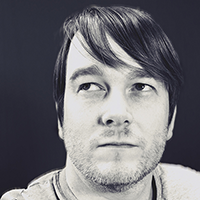Why do I get motivated, but never do anything?
What is it that is preventing us from working hard, developing our craft and gaining mastery of our skill? What is it that throws us off track to the point where we give up and move onto something else that we desire?

As I further explore the traits and habits that successful and happy people have, I have observed that it is not uncommon for individuals to get motivated by a new goal, but then take no steps to do it. Reflecting on my own experience and of those who I encounter, it is a perplexing and saddening affair to watch one's dreams dissipate into nothingness.
What is it that is preventing us from working hard, developing our craft and gaining mastery of our skill? What is it that throws us off track to the point where we give up and move onto something else?
Is it just bad habits? Is it laziness? Did we really want it at all, or was it all just a wish without any real commitment? Are we just being hard on ourselves or do we just lack the confidence to accept the failures and overcome them triumphantly?
As I seek to answer this, I uncover a phenomenon called motioning, or to be in motion rather than in action.
Imagine you want to become a better writer. You read a few articles about writing techniques, then you find an online training course on the subject. This feels great as you're gaining a new perspective and knowledge on the subject which you previously did not have. Your motivation peaks and you get excited so you turn to social media to announce your new found passion and goal — to write a book. You may even plan out a few chapters and a catchy title. You then retire for the night and feel pumped and positive. Tomorrow will be the start of your new found path.
Morning arrives and as you wake, you slip right into your previous routine. The groggy memory of the excitement last night starts to fade. You still feel positive, but real life is calling you back to the fray. The day is tiring, and your new learning and book become passive thoughts when you have a spare moment.
The days pass, then weeks. You feel a sense of guilt that you haven't acted on the thing you announced very proudly on social media. You regard those articles on writing as critical assets, the doorway that lights the path to your new future life once again. You're scared to close those precious few browser tabs that keep your dream alive. You eventually close them and they are lost forever, along with your dream of being a writer.
As dramatic as this scenario may be, we all face this type of challenge. We have a spark of motivation which is crucial to finding a new path, but we often act hastily. We are ill equipped to turn that motivation into a habit — a habit that will carry us to achieving our goal. This is motioning — all intent and no action.
The worst part is that our brain is not well equipped to tell the difference between actually achieving, or the mere intent to achieve, our goal. The sheer fact that we broadcast our intention, collect articles and make a plan is enough for our brain to feel good, so we stop taking action. We were in motion, but yielded no action — and our brain tricked us.
The good news however is that this is completely normal behaviour. We are often blind to its presence, but once we recognise it, we can do something about it. So let's explore how we can avoid the act of motioning, and start doing.
Avoid extrinsic rewards
We want to avoid putting our rewards on some external validation to measure its value. So don't look to external validation of your goals or actions. This means to stop announcing to the world what you're going to do, and just do it instead. There are no amount of likes, replies and retweets that will move you forward in your goal. Those are just vanity metrics that keep you distracted, but when it's all said and done, hold very little value. Get no engagement and you feel deflated. Get too much engagement and you feel overwhelmed that you've taken on more than you can chew.
The real benefits come from intrinsic rewards. Focus more on the mastery of your craft. If you want to write, focus on the skill of communicating efficiently and elegantly. Only compare yourself to your previous self and never to anyone else.
Schedule your actions
It is one thing to create a plan of what to do, but it is more useful creating a plan of when to do it. We often abandon goals under the excuse of not having enough time. But yet while we are all given the same 24 hours a day, why is it that some achieve more than others? It's not that we don't have enough time, it's that we never allocated our time to actions we need to take.
Simply scheduling time doesn't mean we'll do it. Be realistic and start with just 5 minutes of time scheduled. A schedule creates a routine, and a routine is formed from habits. Get into the habit of just turning up.
Build on incremental habits
We must start small, and I mean very — almost boringly small. For example, start with writing for 5 minutes per day, every day. Something that we can still do when the motivation fades and the willpower is gone. Writing for 5 minutes will not impact anything in our lives. We can take a special intrinsic satisfaction in doing it consistently and must protect the activity like we need to protect our ability to breathe.
Only when we are comfortable to trust that we can turn up every single day for 5 minutes, then we can start to expand on your actions. Get into the flow of doing the actions that will achieve our goal so that it's frictionless to turn those 5 minutes into 10, 20 and even 60 minutes at a time. We will benefit from the compound effect of all these small habits.
Remove friction
Our physical environment can be a significant hindrance to achieve a state of flow. Imagine that during the course of a day we have a set of willpower coins. The moment something interrupts your flow — an untidy desk, a friend who dumped their daily crap on you, an unexpected telesales phone call or no milk in the fridge — we spend a willpower coin. By the end of the day, we will have used most, if not all of our coins.
We must avoid spending our willpower coins by optimising our physical, social and spiritual environment. Clear our space, plan our meals, turn off our phones, be mindful to avoid negative conversations and meditate to clear our mind of daily stresses. With practice, we'll be able to enter a state of flow when we carry out the actions for your goals.
Be committed — deeply committed
We often have an image of ourselves that we wish we were. We may wish we could play the guitar, look athletic or write a book. The list is almost endless and with a spark of motivation we may set our sights on these goals. The truth however is a little more harsh than we'd like to admit. More often than not, we don't really want these things. We are interested in them, but we're not committed.
This means we won't give up our daily comforts and introduce new stresses and pains to get it. We don't obsess and strive to push for every waking moment to seek it. We simply just weren't that interested.
In order to succeed we need to pick our primary calling of what we are prepared to sacrifice our comforts for. Everything else is secondary and we should avoid spending energy on these and focus on our one true goal.
Sometimes we may not know what that true goal is. That's actually okay. Using incremental habits to keep turning up and develop our mastery, we can turn one of our interests into something we are committed to. Experts often only become masters in their craft after years of turning up and doing the work, and not because they were passionate about it.
Once we find our true goal, we must remove the noise that is distracting us. We need to be okay with letting go so that we can focus our energy on the actions that will help us succeed.
Motioning if left unchecked means we continue a cycle of being dreamers who are perpetually waiting for something external to make our dream happen. By observing this we can recognise it and mitigate the negative effects. We can focus on small habits that allow us to develop grit so we stick through it when motivation and willpower are at an all time low. We can turn our attention inwards and value the mastery of our craft rather than the validation from others. We can be comfortable with letting go of the things that are noise, be patient — and create a habit of doing.
Motioning if left unchecked means we continue a cycle of being dreamers who are perpetually waiting for something external to make our dream happen. By observing this we can recognise it and mitigate the negative effects. We can focus on small habits that allow us to develop grit so we stick through it when motivation and willpower are at an all time low. We can turn our attention inwards and value the mastery of our craft rather than the validation from others. We can be comfortable with letting go of the things that are noise, be patient — and create a habit of doing.
If you liked this post and want to learn how to improve your own ability to recall the insights and stories from what you read, then consider checking out my book Atomic Note-Taking.

This post is part of the Mindset and Mastery newsletter. Don’t miss the next issue by subscribing to get it in your inbox.

